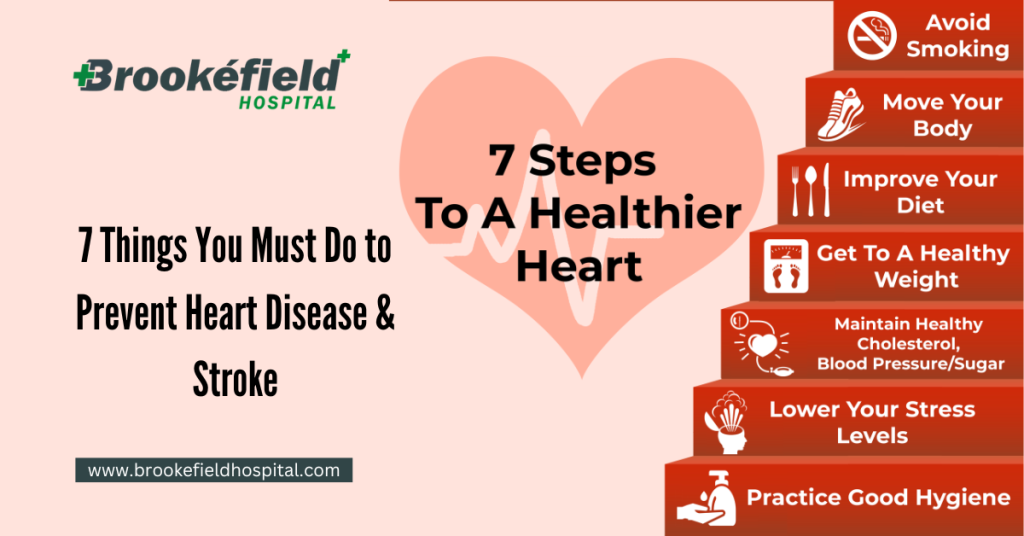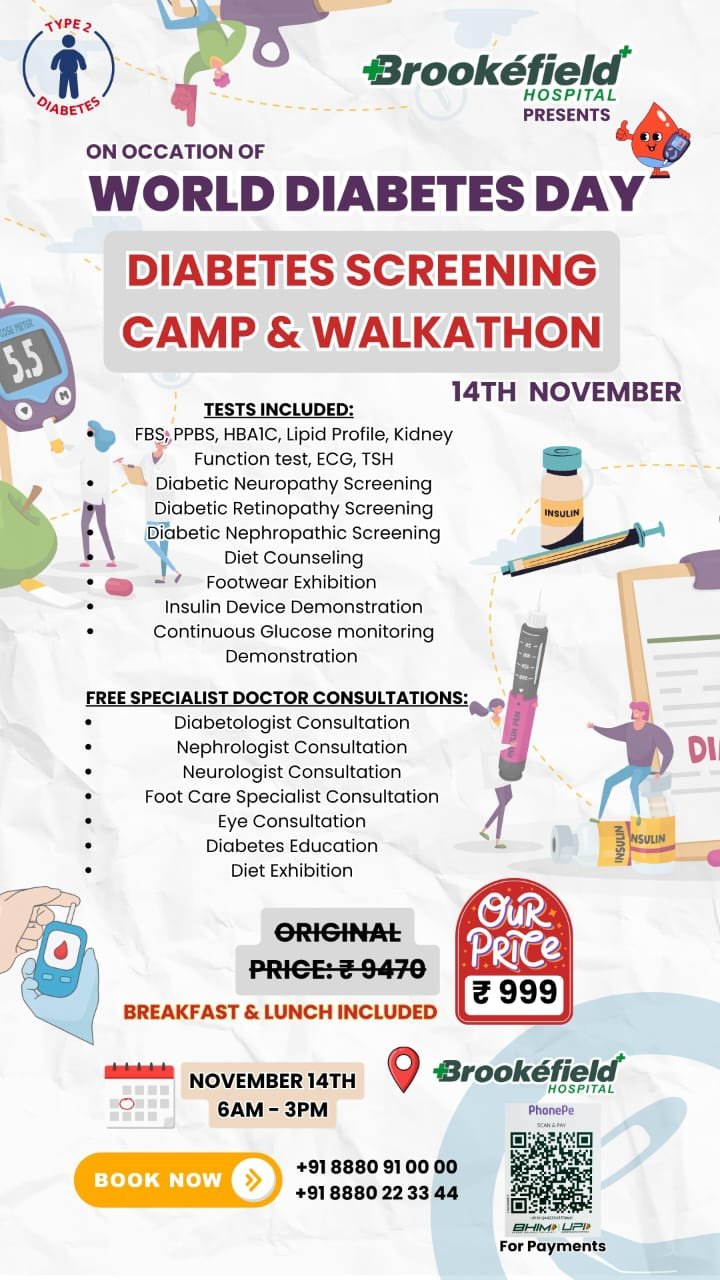7 Things You Must Do to Prevent Heart Disease & Stroke: Welcome to our comprehensive guide on things you must do to prevent heart disease and stroke.
In this article, we will explore various strategies, lifestyle changes, and preventive measures that can help you maintain a healthy heart and reduce the risk of cardiovascular diseases. Heart disease and stroke are major health concerns worldwide, and by adopting these preventive measures, you can take control of your heart health.
7 Things You Can Do to Prevent Heart Disease
1. Eat a Heart-Healthy Diet
Maintaining a balanced and nutritious diet is essential for a healthy heart. Include a variety of fruits, vegetables, whole grains, lean proteins, and healthy fats in your meals. Avoid excessive intake of saturated and trans fats, cholesterol, and sodium. Opt for cooking methods like baking, grilling, or steaming instead of frying. Incorporate foods rich in omega-3 fatty acids, such as fatty fish like salmon or mackerel, flaxseeds, and walnuts.
2. Engage in Regular Physical Activity
Physical activity plays a crucial role in preventing heart disease and stroke. Aim for at least 150 minutes of moderate-intensity aerobic exercise or 75 minutes of vigorous-intensity exercise every week. Choose activities you enjoy, such as brisk walking, cycling, swimming, or dancing. Regular exercise helps maintain a healthy weight, lowers blood pressure, improves cholesterol levels, and reduces stress.
3. Manage Stress Levels
Chronic stress can contribute to heart disease and stroke. Find healthy ways to manage stress, such as practicing mindfulness meditation, deep breathing exercises, or engaging in hobbies you enjoy. Make time for relaxation and self-care activities. Adequate sleep is also essential for stress management and overall heart health.
4. Maintain a Healthy Weight
Excess body weight, especially around the waist, increases the risk of heart disease and stroke. Maintain a healthy weight by adopting a balanced diet and engaging in regular physical activity. Aim for a body mass index (BMI) within the healthy range. Consult with a healthcare professional to determine a suitable weight loss or weight management plan if needed.
5. Quit Smoking
Smoking is a significant risk factor for heart disease and stroke. If you smoke, quitting is the best thing you can do for your heart health. Seek support from healthcare professionals, join smoking cessation programs, or try nicotine replacement therapies. The benefits of quitting smoking are immediate and long-lasting.
6. Limit Alcohol Consumption
Excessive alcohol consumption can contribute to heart disease and stroke. Limit your alcohol intake to moderate levels. For men, this means up to two drinks per day, and for women, one drink per day. If you find it challenging to control your alcohol consumption, seek help from healthcare professionals or support groups.
7. Monitor and Manage Blood Pressure
High blood pressure is a significant risk factor for heart disease and stroke. Regularly monitor your blood pressure and take steps to keep it within the healthy range. Follow a heart-healthy diet, engage in regular exercise, manage stress, limit sodium intake, and consider medication if necessary. Consult with a healthcare professional for personalized guidance.
8. Control Cholesterol Levels
High cholesterol levels can lead to the formation of plaque in the arteries, increasing the risk of heart disease and stroke. Maintain healthy cholesterol levels by adopting a heart-healthy diet, exercising regularly, and, if needed, taking medication as prescribed by a healthcare professional. Regular cholesterol checks are essential for monitoring your levels.
Choose Brookefield Hospital For Heart Diseases Treatment
Brookefield Hospital is a reputable Cardiology hospital in Bangalore and a healthcare facility known for providing comprehensive and advanced treatments for heart diseases. There are several reasons why one might choose Brookefield Hospital for heart diseases treatment:
Experienced Cardiologists: Brookefield Hospital has a team of highly experienced and skilled cardiologists who specialize in the diagnosis, management, and treatment of various heart conditions. These specialists have extensive training and expertise in the latest techniques and technologies for heart disease treatment.
FAQs (7 Things You Can Do to Prevent Heart Disease)
1: What are the common symptoms of heart disease and stroke?
Common symptoms of heart disease include chest pain or discomfort, shortness of breath, fatigue, irregular heartbeats, and dizziness. Stroke symptoms may include sudden weakness or numbness on one side of the body, difficulty speaking or understanding speech, sudden vision changes, severe headaches, and loss of balance or coordination.
2: Can heart disease and stroke be hereditary?
Yes, certain risk factors for heart disease and stroke, such as high blood pressure and high cholesterol, can be hereditary. However, adopting a healthy lifestyle can help mitigate these risks even if there is a genetic predisposition.
3: Are men more prone to heart disease and stroke than women?
Both men and women are at risk for heart disease and stroke. However, certain risk factors, such as age and hormonal changes, may affect women differently. It is crucial for everyone to prioritize heart-healthy habits regardless of gender.
4: Is it possible to reverse heart disease?
While heart disease is a chronic condition, it can be managed and its progression can be slowed or even reversed through lifestyle changes. Adopting a heart-healthy diet, engaging in regular exercise, quitting smoking, and following medical advice can make a significant difference.
5: Can stress directly cause heart disease and stroke?
While stress itself may not directly cause heart disease and stroke, it can contribute to the development and progression of these conditions. High levels of stress can lead to unhealthy coping mechanisms like overeating, smoking, or excessive alcohol consumption, which can increase the risk of cardiovascular diseases.
Early Indication of Heart Diseases: Signs, Symptoms, and Prevention
Conclusion: 7 Things You Can Do to Prevent Heart Disease
Taking care of your heart is essential for a long and healthy life. By implementing the things you must do to prevent heart disease and stroke, you can significantly reduce the risk and promote cardiovascular well-being. Remember to eat a heart-healthy diet, engage in regular physical activity, manage stress, and maintain a healthy weight.
Don’t forget to quit smoking, limit alcohol consumption, and monitor your blood pressure and cholesterol levels. Stay informed, practice gratitude, and prioritize self-care. With these strategies, you can empower yourself to take control of your heart health and live a vibrant life.




